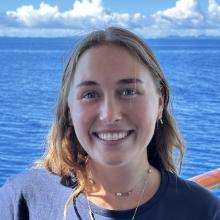
Tess McCormick
Tell us about your work/ research. What kinds of things do you do?
I recently graduated from UCSB with a degree in aquatic biology and an emphasis in documentary filmmaking. With this degree, I plan to pursue a career in documentary filmmaking, and work primarily underwater; I believe this is how I will have the greatest impact on marine conservation globally. I have had a lifelong interest in marine biology and understanding how organisms interact with each other and their environment. More recently, I have been able to intertwine that with my passion for photography, directing several documentaries that explore unique ways in which humans interact with the environment.
What sparked your initial interest in your career?
"From a young age, I have been fascinated by the underwater world and its inhabitants, and acutely aware of the necessity of its protection. This fascination turned into a fixation with every hour spent underwater. In high school, I interned at the local aquarium, educating visitors about resident species and the importance of keeping our oceans clean. I also studied abroad in the Bahamas at the Island School, a program that prioritizes marine exploration and research, which introduced me to marine research and scientific diving. I assisted a marine biologist, capturing the first ever footage of juvenile green sea turtle interactions. As a UCSB student, I have been able to further my understanding of the ocean and apply this knowledge to my experiences in the local marine ecosystem. I have always wanted to work in marine conservation, and during my time at UCSB, I realized I want to do this through filmmaking; if I can show people what I see underwater, they might become fascinated by it too.
Who influenced you or encouraged you the most?
My mentor, an incredible underwater cinematographer, has dedicated significant time and effort to teaching me the technical aspects of underwater cinematography and how to be an effective storyteller. He has taught me the importance of authenticity in filmmaking, especially when conducting interviews and developing a story.
What element of your work/ study do you think is the most fascinating?
I’m deeply fascinated by the diversity and specificity of marine animal adaptations and the intricacies of underwater biological systems. I find it interesting how each species has adapted to fill a unique niche, and I enjoy spending time observing these animals in their habitat to understand and capture their ecological relationships.
How did you get involved with the Nautilus Exploration Program?
I have followed Ocean Exploration Trust since I was in high school and have always been captivated by the work that they do. It has always been a dream to be a part of these efforts, and I feel incredibly lucky to be on this expedition.
What other jobs led you to your current career?
I have had a few incredible opportunities to develop my knowledge both in aquatic biology and documentary filmmaking. I interned at OceanX, where I witnessed the power of intertwining storytelling and compelling visuals to cultivate an appreciation of the ocean among an audience. At UCSB, I directed two documentaries that explore unique ways in which humans interact with the environment and worked in a documentary film lab that covers local controversial environmental stories. I also filmed the most ambitious orangutan conservation project World Wildlife Fund Indonesia has ever pursued, trekking through the Kalimantan jungle to gather footage. As an intern at Imagine Documentaries, I conducted thorough research for future productions and had the opportunity to learn about the power and art of storytelling from exceptional filmmakers.
What are your degrees and certifications?
Bachelors of Science in Aquatic Biology -- University of California, Santa Barbara 2025
What are your hobbies?
I love scuba diving, free diving, surfing, tide pooling, and any ocean related activity!
What advice would you give someone who wants to have a career like yours?
I was first introduced to documentary filmmaking while working at my local dive shop, when a customer came in and initiated a conversation about my interests. He turned out to be an underwater cinematographer who taught a nature documentary course at UCSB, and encouraged me to enroll. After that conversation, I applied to the course, which laid the foundation for my path as a documentary filmmaker. I have had several other impromptu conversations that ended up being pivotal in the development of my career. These moments—initially small or seemingly insignificant—have had a lasting impact on my journey as a filmmaker. My advice would be to stay open to conversations with people from all kinds of professional backgrounds; you never know who might introduce you to a new discipline.
It is incredible that animals have adapted to live in such extreme and inhospitable environments. I am most excited by the opportunity to observe these remarkable adaptations and to better understand how life can persist and even thrive in the deep sea.
Expeditions
Tess participated in the following Ocean Exploration Trust expeditions:
